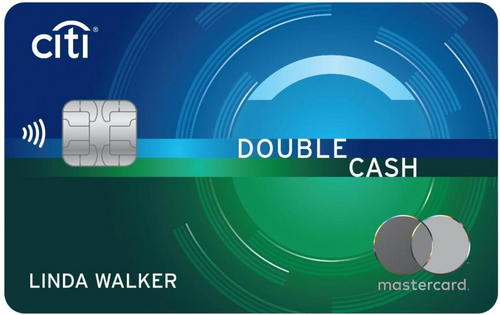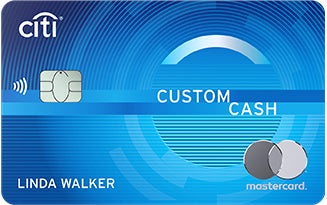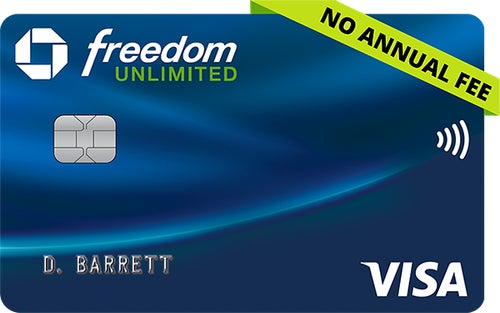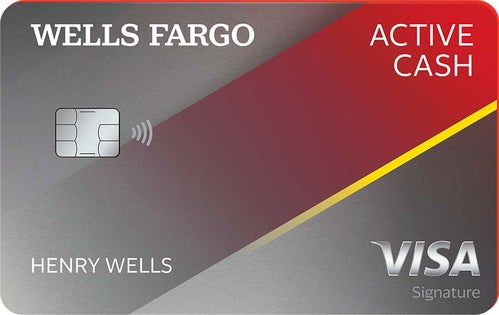| Cash Back Rating: | 4.1 / 5 |
| Rewards Value: | 4.0 |
| APR: | 1.0 |
| Rewards Flexibility: | 4.7 |
| Features: | 3.0 |
| Issuer Customer Experience | 2.0 |
In a Nutshell:
The Wells Fargo Active Cash Card is not just one of the best flat-rate cash rewards cards out there, but one of the best cash rewards cards, period.
Rewards Rate
|  |
Welcome Bonus
|  |
Annual Bonus None |  |
Annual Fee $0 |  |
Average Yearly Rewards Value ($1,325 monthly spend) $318 |  |
APR 18.49%, 24.49%, or 28.49% Variable APR |  |
Rewards Redemption
Cons
|  |
Wells Fargo Customer Service Ratings
|  |
Other notable features: Up to $600 cell phone protection ($25 deductible), zero fraud liability, Visa Signature® concierge service, benefits via Visa Signature Hotel collection
Whether you’re a low-maintenance cardholder looking for an easy way to earn cash back on everything you buy or a rewards aficionado eager to fill a gap in your cash back strategy, the Wells Fargo Active Cash Card should be on your radar.
Not only does this rewards card from Wells Fargo hold its own against the best flat-rate cash back cards on the market, but its rewards program, $0 annual fee, impressive welcome bonus and introductory APR offers also make it a contender for the title of best cash back credit card overall. While no card is perfect, it’s hard to go wrong with a flat-rate card that offers the sort of short- and long-term value you’ll find with the Active Cash Card.
That said, the card may not be the best fit for your individual goals and spending habits. To see if a rewards card that earns a higher rate in specific categories or offers more flexible rewards might be a better choice, size up where you spend the most and what rewards you hope to earn before taking the plunge.
Pros
- Its unlimited 2% cash rewards rate on purchases makes it especially versatile.
- It carries a generous welcome offer, unlike several rival flat-rate rewards cards.
- Its intro APR offers on both purchases and qualifying balance transfers makes it a solid option for paying off debt.
Cons
- You may earn more with a card offering higher reward rates in specific spending categories.
- No travel partners limit the overall value of rewards compared to some competitors.
- Its 3% foreign transaction fee could be a deal-breaker for frequent travelers.
Why you might want the Wells Fargo Active Cash Card
The Active Cash has plenty going for it in terms of value and is easily among the top flat-rate cash back cards on the market. Here’s what makes this card such a standout pick.
Earning cash rewards
Only a handful of cards can compete with the Wells Fargo Active Cash Card’s cash rewards rate on general purchases. You’ll earn a flat 2% cash rewards on qualifying purchases, with no earning limit and no need to track spending or enroll in bonus categories.
Since most cards earn just 1% back on general purchases, a flat 2% cash rewards rate makes the Active Cash card tremendously valuable as both a standalone all-purpose rewards card and a supplementary card to combine with cards that earn rewards at higher rates in specific categories like groceries, dining or gas.
While it may not sound like much, getting 2% cash rewards back on purchases can certainly add up over time. For example, if you spent $15,900 per year (our estimate of the average person’s spending) with your Active Cash card, you’d earn $318 in cash rewards per year, with no annual fee cutting into your rewards balance.
Active Cash card spending example
Even among the best flat-rate cash back cards, an unlimited 2% cash rew
ards rate is about as good as it gets. Assuming you pay off your purchases, the Active Cash card’s rewards rate on general purchases matches that of the Citi Double Cash® Card (1% when you buy and 1% when you pay your bill), the PayPal Cash Back Mastercard and the Fidelity Rewards Visa Signature Card, and beats out the minimum rate you’ll find on other popular rewards cards like the Capital One Quicksilver Cash Rewards Credit Card and the Chase Freedom Unlimited®.
Still, whether the Active Cash makes sense as a standalone cash rewards card will depend on where and how much you spend. Take another cash back card, the Citi Custom Cash® Card*, as an example. The Custom Cash offers 5 percent back in your top eligible spending category each billing cycle (on up to $500 in purchases per cycle, then 1 percent) and 1 percent back on general purchases. If you were to max out your top spending category each billing cycle and put a total of $15,900 on the card each year, you’d earn $399 per year with the Custom Cash, compared to just $318 per year for the same spend with the Active Cash.
| Card | Rewards calculation | Total |
|---|---|---|
| Wells Fargo Active Cash Card | $15,900 x 2% cash rewards back = | $318 |
| Citi Custom Cash Card | ($6,000 x 5% back) + ($9,900 x 1% back) = | $399 |
Then again, heavy spenders who want to stick with a single card can do especially well with a flat-rate card. For example, if you charged more than $24,000 per year with your card, the Active Cash would be a better choice than the Custom Cash Card, as purchases would continue to earn 2 percent cash rewards with the Active Cash once you clear that spending threshold, versus just 1 percent with the Custom Cash.
| Card | Rewards calculation | Total |
|---|---|---|
| Wells Fargo Active Cash Card | $24,000 x 2% cash rewards back = | $480 |
| Citi Custom Cash Card | ($6,000 x 5% back) + ($18,000 x 1% back) = | $480 |
See related: How to pick the best credit card for you
Redeeming cash rewards
Along with one of the best flat rewards rates you’ll find anywhere, the Active Cash card offers a decent variety of cash back redemption options. You can use your rewards for a statement credit, direct deposit into a Wells Fargo checking or savings account or withdraw cash back directly from a Wells Fargo ATM in $20 increments (if you have a Wells Fargo debit or ATM card). You can also redeem for gift cards, purchases and travel through the Wells Fargo Rewards program.
That said, some rewards cards earn points that can be redeemed at a higher value for travel. The Chase Freedom Unlimited and Chase Freedom Flex®, for example, give you a chance to boost the value of your points when you pair with a higher-tier Chase Ultimate Rewards card.
This may not be a deal-breaker if cash rewards are your sole focus, but it’s worth keeping in mind if you’re on the fence about how you plan to use your rewards.
Generous welcome bonus
One feature of the Active Cash Card that sets it apart from nearly all competing flat-rate cards is its welcome bonus. You can earn a $200 cash rewards bonus when you spend $500 in purchases in your first three months.
While many cash back cards offer sign-up bonuses, none of the popular cash back cards that earn at least 2% cash back on every purchase come close to matching the Active Cash card’s welcome offer. In fact, several flat-rate cash back cards – including the Alliant Cashback Visa® Signature Credit Card – carry no sign-up bonus at all. And the bonus is especially nice given the Active Cash’s status as a no-annual-fee credit card.
While a welcome bonus should never be your only reason for getting a card, the Active Cash card’s generous offer gives it a clear advantage over the flat-rate cash back competition. After all, to earn $200 in cash back via card spend, you’d need to charge and pay off a whopping $10,000 with a card like the PayPal Mastercard. Depending on your spending habits and rewards strategy, that could amount to an extra year’s worth of spending.
Card intro APR
The Active Cash card is surprisingly flexible in how it can also help you save on interest. The card comes with a 0% introductory APR for your first 12 months from account opening on purchases and on qualifying balance transfers made within the first 120 days, after which the 18.49%, 24.49%, or 28.49% Variable APR applies. This should make the Active Cash card especially useful for anyone hoping to chip away at existing debt or spread out payments on a big-ticket item.
The card’s intro balance transfer fee of 3 percent (or $5 minimum, whichever is greater) is also reasonable given that plenty of dedicated balance transfer cards charge a 5 percent balance transfer fee. Remember that you must transfer your balance within the first 120 days of account opening; otherwise, your balance transfer fee will shoot up to 5 percent (or $5 minimum), which could add hundreds more to your balance.
Avoid carrying a balance with this card if you can help it. Depending on your creditworthiness, you could be assigned a relatively high ongoing variable APR. While the low-end rate is a bit lower than the current average credit card APR, the high-end is very high indeed, rivaling the rate you’ll find on cards designed for people with bad credit.
Why you might want a different card
While there’s a lot to love about the Active Cash, it can’t fulfill every role we desire from our rewards cards. Here are a few reasons you might want to choose a different credit card.
Card perks
As is expected with a no-annual-fee card, the Active Cash card’s list of perks isn’t particularly robust, but you’ll still enjoy a handful of useful benefits, including:
- Cellphone protection – Pay your cellphone bill with the Active Cash card each month and you’ll enjoy complimentary cellphone protection against covered damage and theft for up to $600 per claim. A $25 deductible applies, but that’s lower than the standard $50 deductible other cards charge.
- Visa Signature® benefits – On top of standard perks like car rental insurance and a pay-per-use roadside dispatch service, you can take advantage of valuable travel and shopping protections like extended warranty coverage, perks like Visa Signature® Concierge Services and discounts on experiences like luxury car rentals and wine country excursions.
While we don’t expect much in the way of perks with a card at this price level, the Active Cash even falls a bit short of some competing no-annual-fee cards. Along with cellphone protection, several of these competitors also carry Mastercard World Elite benefits, which include arguably more practical perks such as discounted meal-delivery subscription services and rideshare credits.
Rewards limitations
The Wells Fargo Rewards program offers a fair selection of redemption options beyond your typical cash back card, including travel and gift cards. However, it lacks any sort of travel partners for point transfers. Competing rewards programs like Amex Membership Rewards or Chase Ultimate Rewards allow you to move your earned points to partnered airline programs such as Southwest Airlines Rapid Rewards or Virgin Atlantic Flying Club. Sometimes this allows you to obtain more value from your points than if you redeemed them on cash back. You might even double the value of your rewards depending on where and when you transfer.
Wells Fargo also features a few limitations on how you can redeem your cash back. For example, you can only withdraw from a Wells Fargo ATM in $20 increments.
Foreign transaction fees
The Active Cash’s high and consistent earning rate isn’t quite so effective when you’re using it abroad. That’s because this card carries a 3 percent foreign transaction fee on every purchase.
This fee completely negates the 2 percent cash rewards you’re earning on card purchases and then some, so if you’re spending an extended period abroad and need a credit card to make purchases, you’ll want to use a no-foreign-transaction-fee credit card to spare yourself unnecessary expenses.
How does the Wells Fargo Active Cash Card compare to other cash back cards?
While the Active Cash Card is clearly a frontrunner in the flat-rate cash back category, it’s not necessarily the best fit for everyone. Depending on your spending habits and how much work you’re willing to put into earning cash rewards, a different style of rewards card may offer more value in the long run. Here are a few other flat-rate cash back cards worth consideration:
 | 
|  |
Rewards rate
| Rewards rate
| Rewards rate
|
| Welcome bonus | Welcome bonus | Welcome bonus |
| Annual fee $0 | Annual fee $0 | Annual fee $0 |
Other things to know
| Other things to know
| Other things to know
|
Wells Fargo Active Cash vs. Citi Custom Cash Card
If you’re willing to put a little more effort into maximizing your rewards, the Citi Custom Cash could be a great alternative to the Active Cash card.
For moderate spenders who find that restaurants, gas stations, grocery stores and other eligible categories make up enough of their budget to maximize the $500 cash back spending limit per billing cycle, the Custom Cash card may offer a more rewarding balance of consistency and flexibility than the Active Cash.
Wells Fargo Active Cash vs. Citi Double Cash
Though it earns the same flat-rate rewards as the Active Cash card (assuming you pay off your bill each month), the Double Cash has a couple of key advantages. For one, its balance transfer offer is more generous than the Active Cash card. You’ll enjoy 18 months of 0% intro APR (17.49% - 27.49% (Variable) APR after that) on balance transfers, versus just 12 months from account opening of 0% intro APR on qualifying balance transfers (18.49%, 24.49%, or 28.49% Variable APR after that) with the Active Cash. The Double Cash also gives you slightly more flexibility over how you use your rewards, since you can pair the card with a Citi travel card to transfer points to travel partners – sometimes at a higher point value.
Wells Fargo Active Cash vs. Chase Freedom Unlimited
While its 1.5 percent cash back rate on general purchases falls short of the Active Cash card’s, the Chase Freedom Unlimited card offers far more travel rewards flexibility. Instead of pure cash back, you’ll earn Ultimate Rewards points that you can redeem for cash back, travel and more. These points can also be transferred to a higher-tier Chase card and redeemed for travel at an up to 50% higher value. Plus, along with the 1.5% cash back you’ll earn on general purchases, you’ll earn a higher flat rate in practical categories like travel booked with Chase Travel, dining and drugstore purchases.
How to use the Wells Fargo Active Cash Card
- If you have multiple rewards cards, use the Active Cash card for all spending that earns less than 2% cash rewards back on your existing cards.
- Spend at least $500 in the first three months to secure the $200 cash rewards bonus.
- Take advantage of the card’s intro APR offer on qualifying balance transfers and new purchases to chip away at existing card debt or finance large expenses while minimizing interest charges.
- If you need to transfer a balance, be sure to do so within the first 120 days of opening your account; otherwise, your balance transfer fee will jump from intro 3% up to 5% (or $5 minimum, whichever is higher).
- Pay your cellphone bill with the card for up to $600 of protection against covered damage or theft (keep in mind a $25 deductible applies).
Is the Wells Fargo Active Cash Card right for you?
The Wells Fargo Active Cash Card charges no annual fee, carries one of the most competitive flat cash rewards rates on the market and even includes a generous welcome bonus and intro APR offers – so for us, it’s a no-brainer: Yes, the Active Cash is absolutely worth an application. If cash back is your focus and you want to avoid the headache of tracking categories or juggling multiple cards, the Active Cash should be high on your list.
*All information about the Citi Custom Cash Card has been collected independently by CreditCards.com and has not been reviewed by the issuer.
Frequently Asked Questions
All reviews are prepared by CreditCards.com staff. Opinions expressed therein are solely those of the reviewer and have not been reviewed or approved by any advertiser. The information, including card rates and fees, presented in the review is accurate as of the date of the review. Check the data at the top of this page and the bank’s website for the most current information.
Responses to comments in the discussion section below are not provided, reviewed, approved, endorsed or commissioned by our financial partners. It is not our partner’s responsibility to ensure all posts or questions are answered.
Partner Offer
